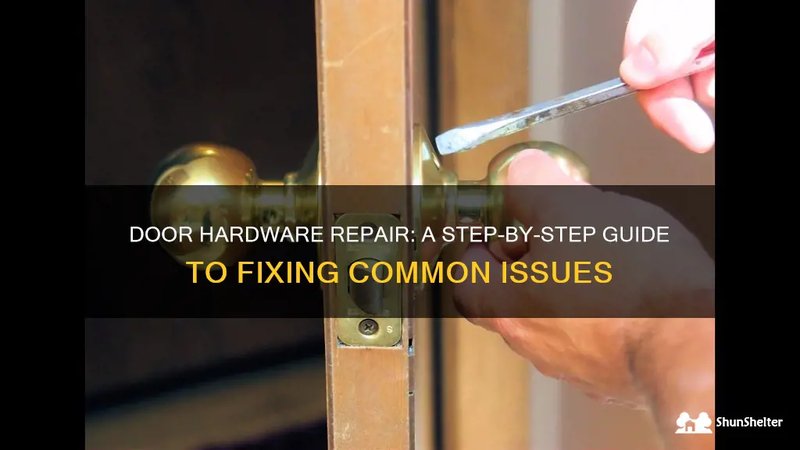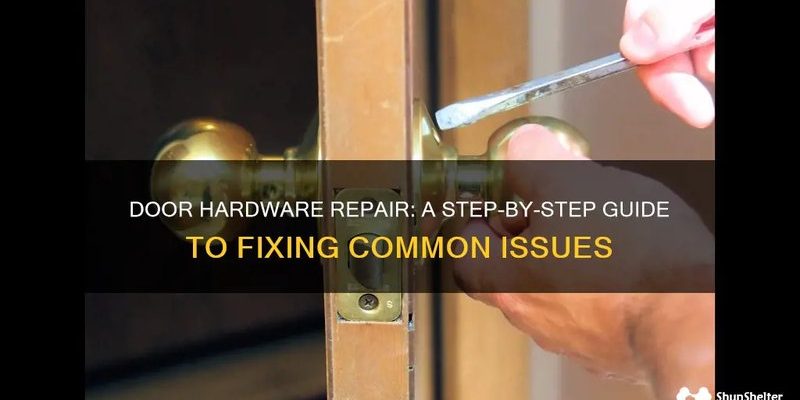
You might liken the situation to a car—if the brakes are making a weird noise, do you just adjust them, or is it time for a full replacement? The same goes for your door hardware. It’s important to know how to spot signs that your door hardware could use some TLC. In this guide, we’ll explore how to assess your door hardware and whether it’s time for a repair or a complete overhaul.
1. Checking for Physical Damage
The first step in determining if your door hardware needs repair or replacement is to inspect it for any physical damage. A thorough examination can often reveal issues that aren’t immediately visible. Look for cracks, dents, or rust on your door handles, hinges, and locks. Even minor scratches can signal underlying problems.
Hinges can lose their effectiveness over time. If you notice that your door is sagging or doesn’t close properly, it might be a sign that the hinges are damaged or worn out. It’s like trying to walk with a bad shoe—you might keep going, but it’s going to be uncomfortable.
Similarly, check your door locks. A key that gets stuck or doesn’t turn smoothly could indicate that the lock mechanism is failing. In this case, a quick cleaning might help, but it’s essential to consider whether the lock needs to be replaced entirely if the issue persists.
2. Understanding Wear and Tear
Everyday use naturally causes wear and tear on door hardware. Think about how many times a day you open and close your doors. Over time, components can wear down. For instance, the spring mechanism in a door closer can weaken, making it difficult for the door to close properly.
As you assess wear and tear, consider how smoothly your door operates. Does it stick or make a grinding sound? These issues can often be fixed with a little oil, but persistent problems might warrant a closer look at the components.
You might also notice that the door handle feels loose or wobbly. This could be an easy fix with a simple tightening of screws, but don’t ignore it. If the hardware continues to feel unstable, it may need replacing.
3. Evaluating Security Concerns
When it comes to your home, security should always be a top priority. If you feel that your door hardware is no longer secure, it’s time to take action. A flimsy lock or one that doesn’t engage properly poses a significant risk.
You might be wondering how to evaluate your locks for security. Start by checking how well the lock engages when you turn the key. If it feels loose or you can jiggle it, this could be a sign that it’s time for a replacement. Additionally, if your lock uses an outdated system, it’s worth considering a modern upgrade for improved security features.
Also, assess the condition of your door frame. If it’s warped or damaged, it might compromise the effectiveness of your locks. A compromised frame could require both lock and frame replacements to restore security to your entry points.
4. Evaluating Functionality
Is your door hardware functioning as it should? If you find yourself needing to jiggle the handle or push the door just right to get it to open, that’s a red flag. Functional issues often indicate that some parts may be worn out or misaligned.
Start by testing the door’s functionality regularly. Open and close it a few times to see if everything feels smooth. If it’s not, check for misalignment. Sometimes, it might just need a minor adjustment, like tightening screws or adjusting the hinges.
In cases where the hardware is outdated or no longer functions correctly, replacement is a more permanent solution. Investing in reliable, modern hardware can save you from future headaches and security concerns.
5. Knowing When to Call a Professional
Sometimes, despite your best efforts, you might realize that door hardware issues require a professional touch. If you’re unsure about the repairs or replacements you need, it’s totally okay to call in an expert. They can diagnose the problem accurately and recommend solutions.
You might think, “What’s the point?” but getting a pro involved can actually save you time and money in the long run. They’ll provide the correct parts and ensure everything is installed correctly. This way, you can focus on more important things, like enjoying your home.
If you choose to hire someone, make sure to check their credentials and read reviews. A trusted professional can make all the difference in ensuring that your door hardware is secure and functional.
6. Cost Considerations: Repair vs. Replacement
When deciding whether to repair or replace your door hardware, consider the cost implications. Sometimes, a small repair might be all that’s needed, while other times, replacing the hardware entirely can be more cost-effective in the long run.
Start by calculating the cost of repairs against the cost of new hardware. If repairs are only slightly cheaper than replacements, you might want to opt for the new hardware, especially if it comes with updated features and warranty coverage.
Another thing to think about is the age of the hardware. An older lock or handle might be more prone to future issues. If it’s been more than a decade since you installed your door hardware, it may be time to invest in something new.
7. DIY Repair Tips
If you’ve decided to tackle repairs yourself, there are a few quick fixes you can try. Start by gathering basic tools—like screwdrivers, pliers, and lubricant—to make the process easier. Here’s a simple checklist to follow:
- Check screws: Tighten any loose screws on handles and hinges.
- Lubricate moving parts: Use a silicone spray on hinges and locks to ensure smooth operation.
- Realign misaligned doors: Sometimes, a simple adjustment can solve sticking issues.
- Inspect for rust: For metal parts, use a rust remover and touch-up paint if necessary.
If these steps don’t resolve the issues, it might be time to consider replacement or consult a professional.
8. Conclusion: Maintaining Your Door Hardware
In the end, knowing how to determine if your door hardware needs repair or replacement is essential for maintaining the safety and functionality of your home. Keep an eye out for physical damage, evaluate wear and tear, and always assess security concerns. When it’s time for repairs, don’t hesitate to tackle minor fixes yourself or call in a pro if you need help.
By staying proactive about your door hardware, you can ensure that your home remains safe, secure, and inviting. Remember, it’s always better to address issues early rather than waiting for them to become bigger problems. A little maintenance goes a long way!
